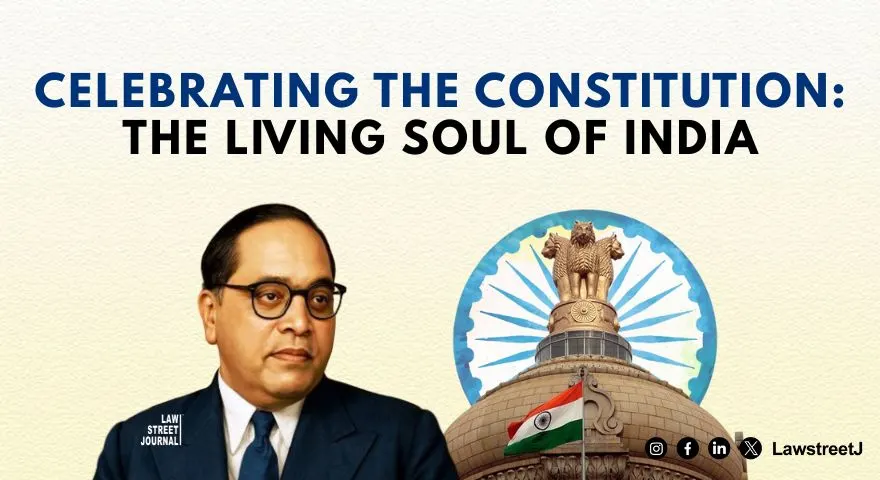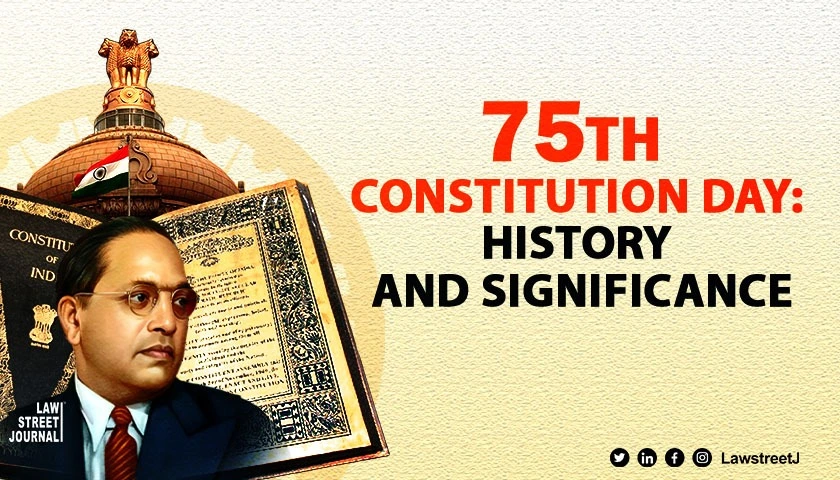New Delhi: Constitution Day in India, also known as Samvidhan Diwas, is observed annually on November 26. This day is not a mere date on a calendar but a profound national observance commemorating the historic adoption of the Indian Constitution by the Constituent Assembly on November 26, 1949. The annual observance promotes and reaffirms the country’s commitment to its foundational constitutional ideals and democratic traditions, reflecting deeply on India’s transformative journey. The essence of this document was captured eloquently by Dr. B.R. Ambedkar, who stated that the Constitution is “not a mere lawyer’s document; it is a vehicle of life, and its spirit is always the spirit of the age.” Dr. Ambedkar, famously known as the “chief architect” or “father” of the Indian Constitution, holds a unique and pivotal position in this national legacy.
The formal recognition of November 26 as Constitution Day came in 2015, declared by the Government of India under the Ministry of Social Justice and Empowerment. This decision aimed to promote constitutional values and, significantly, commemorate the 125th birth anniversary of Dr. Ambedkar. Before this initiative by the NDA government, the day was historically recognized as Law Day. The foundational work of drafting the Constitution began earlier, when on December 9, 1946, the Constituent Assembly convened for its first sitting. The task before its members—poets, teachers, farmers’ sons, lawyers, and freedom fighters rather than professional constitution-makers—was monumental: to unite 560 princely states, 14 major languages, countless cultures, and millions of aspirations without any pre-existing blueprint from the British. The drafting process spanned almost three years, concluding after 2 years, 11 months, and 18 days, across 11 sessions and 165 days of intense debate. The Drafting Committee, chaired by Dr. Ambedkar, processed thousands of proposals and codified them into the framework of the nation’s principal parchment. Though adopted on November 26, 1949, the Constitution officially came into effect on January 26, 1950—a date chosen because on the same day in 1930, the Congress had declared Poorna Swaraj, or complete independence. Thus, January 26 is celebrated as Republic Day.
The philosophical core of the Indian state is encapsulated in the Preamble, which expresses the ideals and aspirations of a renascent India emerging from foreign domination and exploitation. The Preamble solemnly resolves to constitute India into a Sovereign, Socialist, Secular, Democratic Republic and secures to all citizens Justice (social, economic, and political), Liberty (of thought, expression, belief, faith, and worship), Equality (of status and opportunity), and promotes Fraternity. Dr. Ambedkar provided the moral and political framework for this vision, entering the Assembly with the primary aspiration of safeguarding the interests of the depressed classes. He profoundly argued that political democracy, characterized by “one man one vote and one vote one value,” is fundamentally contradicted by pervasive social and economic inequalities that deny the principle of “one man one value” in daily life. For democracy to be meaningful, he insisted on the interdependence of liberty, equality, and fraternity. He cautioned that liberty without equality leads to the supremacy of a few, while equality without liberty stifles individual initiative; and without fraternity, neither can endure. He viewed fraternity—a sense of common brotherhood—as the “glue that holds India together” and essential for eroding caste and religious divisions.
The body of this living soul is contained within a comprehensive and intricate legal manuscript, often considered the world’s longest written Constitution. Dr. Ambedkar’s influence is undeniably present throughout its structure, offering extensive safeguards, including civil liberties and socio-economic rights. Notably, Part III outlines the Fundamental Rights, which are the cornerstone of the Constitution. Among these, Article 17—abolishing untouchability and prohibiting its practice in any form—is considered a groundbreaking provision that brought a “social revolution” to India by criminalizing these practices. The Constitution also guarantees that if these fundamental rights are violated, citizens may approach the Supreme Court directly under Article 32, a provision Dr. Ambedkar famously deemed the “very soul of the Constitution and the very heart of it.” In addition to rights, the document features the Directive Principles of State Policy in Part IV, which aim to promote social and economic democracy by guiding the State to protect the interests of deprived sections. Ambedkar was also instrumental in instituting the Policy of Inclusion, which includes reservations for Scheduled Castes and Scheduled Tribes, aimed at ensuring their adequate representation and correcting centuries of exploitation.
The Constitution’s resilience is safeguarded by the Basic Structure Doctrine, established by the Supreme Court in the Kesavananda Bharati case (1973). This doctrine dictates that while Parliament holds the constituent power to amend the Constitution, it cannot use this power to alter, damage, or destroy the Constitution’s core framework, which includes essential elements like the supremacy of the Constitution, democracy, federalism, and the rule of law. This mechanism ensures that the Constitution remains stable yet flexible, allowing it to breathe and evolve with the nation while preserving its foundational essence.
However, celebrating Constitution Day also necessitates introspection, as the distance between constitutional promise and socio-economic reality remains considerable. Dr. Ambedkar’s concern about the incomplete nature of equality persists, visible in demands for caste-based opportunities and the widening economic divide. For millions of India’s teeming masses—the farm labourer, the rickshaw puller, the slum dweller—who struggle daily for livelihood, liberty and fundamental rights often feel distant and inaccessible. This leads to the unfortunate truth that “it is not the Constitution that failed us; it is we who failed the Constitution” by inadequately implementing its spirit.
Ultimately, the solemn occasion of Constitution Day, observed as a working day, is an invitation for every citizen to reflect and renew their commitment. The Constitution is a document written for the weak, placing the highest value on the dignity of the individual. To cherish this legacy, citizens are called upon to read the Preamble slowly to internalise the promise it holds, celebrate India’s diverse and composite culture, and, critically, practice fraternity—the moral glue that must hold the nation together. The Constitution was designed not to end with the signatures of the framers but to be continually completed by the actions, choices, courage, and responsibility of every Indian. When we celebrate Constitution Day, we affirm that we do not merely enjoy rights—we carry forward a legacy and continue the story of India’s magnificent, complicated nationhood.




![Each branch of governance must honour its constitutionally assigned distinct role: CJI [Read Speech]](/secure/uploads/2024/11/lj_1325_WhatsApp_Image_2024-11-27_at_3.25.09_PM.webp)
![Not indulged in any encroachment, have confined my work within Constitution’s framework: PM Modi [Read Press Relese]](/secure/uploads/2024/11/lj_6122_WhatsApp_Image_2024-11-27_at_3.38.12_PM.webp)






